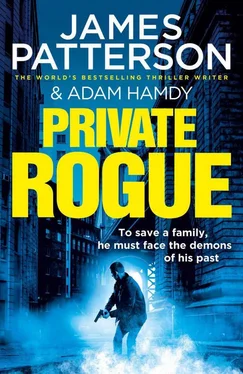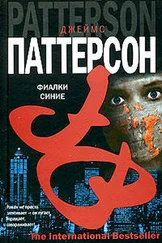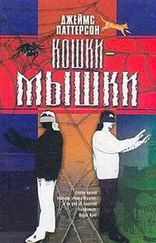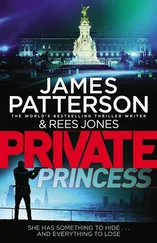Jack Morgan.
Back from the dead.
I had rarely been happier to see the shimmering lights of a city. We’d used the chopper’s course plotter to get us to Kabul, relying on pilot’s instinct and grasp of general direction when the computer’s Cyrillic threw up navigation waypoints we couldn’t understand.
“OAKB, Kabul International, OAKB, Kabul International, this is Mi-4769,” I said, giving the chopper’s call sign.
“Go ahead, Mi-4769,” the air traffic controller said.
“Mil Mi-24, requesting landing,” I replied. “We’re running low on fuel.”
It wasn’t a lie. These choppers weren’t designed for long distances and we’d pushed the aircraft to the limit.
“Copy that, Mi-4769,” the air traffic controller replied. “Proceed on heading two-nine. You’ll see the helipad to the northwest of maintenance building Alpha Two.”
“Copy that, OAKB control,” I replied.
I banked right, changing to a heading almost thirty degrees off compass north. We flew low over the city, which was coming to life with the approach of dawn. The fluorescent lights of a few cafes shone here and there, and a line of trucks queued outside the city’s famous bird market. Newsstands and bakeries were opening up and traffic was starting to build in the main thoroughfares.
Then I saw the outline of the control tower at Hamid Karzai International Airport, and the transit lights for helicopter approach to the airport. I swung us left a touch, adjusting to put us in the center of the path. There were no other aircraft in sight when we flew over the airport car park and some warehouses. I saw a large hangar with ‘A2’ painted on its roof, and beyond it the helipad lit for our landing.
The GlobalRanger that had taken me from Kabul to Kamdesh was in one of the stands near the helipad. As we approached, I saw Feo and Dinara step out of the aircraft.
“Your people?” Floyd asked.
I nodded. “Good people.”
I slipped the tail round and set the Hind down on the pad.
“Smoothly done,” Floyd remarked as I powered down.
We climbed out of the cockpit and jumped onto solid ground. My friends hurried over. Dinara was crying, but her tears ran down her face into a beaming smile. She hugged me and kissed me on the cheeks over and over.
“Jack Morgan,” she said. “Don’t you ever do that again.”
“You’re a tough old bear,” Feo said, pulling me away from Dinara and wrapping me in a suffocating embrace. “You make me proud. If I didn’t know otherwise I would say you were Russian.”
“I’m flattered,” I said.
“You should be,” he replied, as I stepped away. “How did you get a flying tank?” he asked, nodding toward the Mi-24 Hind.
“We asked politely,” I replied with a smile. “This is Joshua Floyd. Joshua, this is Feodor Arapov and Dinara Orlova. Colleagues from our Moscow office.”
“Good to meet you,” Floyd said.
Feo shook his hand and pulled him into a crushing hug. “You cheated death, my friend. No need to pretend you are a stranger who is only worthy of a handshake. Did Jack save you?”
“Actually it was the other way round,” I replied, as Floyd broke free of the man’s embrace. “Joshua got us inside a cave just before the second rocket hit.”
“Then we are all in your debt, Captain Floyd,” Feo said.
“We’ve arranged your flight back to New York,” Dinara said, leading us toward the GlobalRanger. “A G650 is ready to depart whenever you are.”
She leaned into the cabin of the helicopter and produced a black flight case about the size of an oven.
“We’ve received a report from Justine, which is in here, along with some clothes and equipment you might need,” she said.
“You ready to fly,” I asked Floyd.
“Are you kidding? I can’t wait to see Beth and the kids,” he replied.
Dinara shot me a knowing look, but neither of us said anything.
“We’ll take you to the terminal,” Feo said.
“That Hind is full of gear,” I told him. “You might want to check it before you leave. See if there’s anything you like.”
“A little plunder?” he said with a deep laugh. “It’s good for the soul.”
I took the flight case from Dinara. “Thank you for everything.”
“Anytime,” she replied, before kissing me on the cheek.
“Let’s go,” Feo said. “Time for you lucky men to head home.”
Beth Singer awoke from terrible dreams to find herself strapped to a pipe, her arms almost stretched to breaking point high above her head, her toes just touching the ground, so every movement was a strain and simply standing still caused untold suffering.
She had dreamed of a horrific cacophony assaulting her, death metal rock music alternating with the sounds of children screaming. Was it Maria and Danny? Where were her children? The nightmare had seemed to go on forever until in a moment of clarity she realized she was awake: the nightmare was real. It all came back to her then. How they’d grabbed her and the children. How she’d been knocked unconscious when she’d tried to fight the men off. And now she was here, alone.
Beth had completed an escape and interrogation course during her training at Fort Bragg and she guessed she was being prepared for questioning. The people who’d abducted her were trying to break her spirit. She’d been suspended in a stress position and the horrific sounds were a recording designed to grind her down psychologically. After countless hours, she came to recognize patterns in the traumatic loop.
“Please,” she tried to scream, but she’d been gagged, so she couldn’t tell them their efforts were unnecessary. She’d have gladly said or done anything they wanted in exchange for her children’s safety. With Joshua gone, they were all she had left.
Beth had spent hours weeping for Danny and Maria, picturing their faces, imaging the worst, pleading with God, begging fate to intervene and for the universe to be kind to them. She’d cried with exhaustion. Wept with shame at her inability to protect her children. She cried with abject pity for herself, and finally, when she could cry no more, she hung there limp as a joint of meat, as numb as though she’d been anesthetized.
Beth lost all sense of time. The music no longer had any effect on her, nor did the screams. Drained of all hope, she felt nothing at all. Anger, fear, frustration — all these emotions were contingent on the idea that a situation could be improved, that an outcome could be avoided or escaped. But Beth had come to accept that she and her children were lost. Everything was lost. Jack Morgan and his people had failed them. And in the grip of that knowledge, she felt nothing. That was the true nature of despair. It was absolute. There was no emotion, because there was no hope.
It took a moment for her to realize the music had stopped, and she became aware of a crack of light at the bottom of her hood. Her ringing ears made out the sound of footsteps. Someone reached out and touched her belly. The thought of someone’s fingers on her bare skin made her recoil. She’d been stripped to her underwear at some point, another ounce of her dignity she had been forced to surrender.
“Elizabeth,” a man said. “Do you want to see your children again?”
They were alive, she thought, and the hope that she’d thought extinguished was rekindled. With it came longing, anger and anxiety. Where were they? Had they been hurt? Would they live through this?
Beth felt hands reach under her hood and pull her gag down.
“Please.” Her voice sounded thin and pathetic. She was ashamed to have allowed herself to get in such a vulnerable position. She — a trained warrior. “Please tell me what you want.”
Читать дальше












